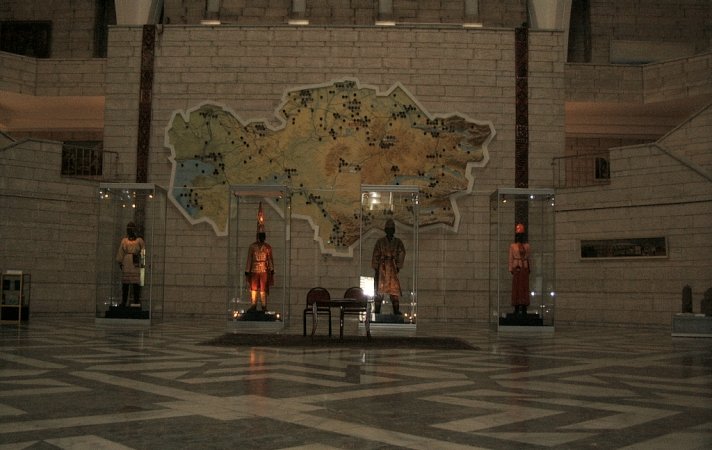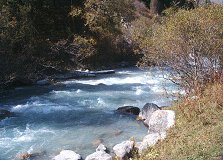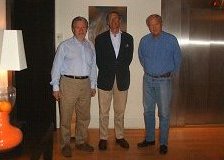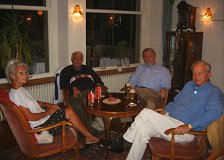Global Charitable Operations
WIF and Central Asia
1.1 The REPUBLIC of KAZAKHSTAN
WIF management headed by Dr. David Hill and Dr. Lutz Baehr visited Kazakhstan between 12th and 23rd August 2005. Meetings were held with very senior representatives of the Kazakh Republic and regional advisers in Almaty. These discussions culminated in the signing of a Memorandum of Understanding. Details of such will be elaborated in the next edition of Scientific Discovery, but where the overall documents were of long-term cooperation and capacity building of Kazakhstan.

Overview of the Kazakh Republic
Kazakhstan is rich in natural resources and is endowed with nearly all the physical Elements on the Period Table. Oil and Gas reserves are of global significance and where predictions indicate that this country will be one of the world's major oil and gas providers by 2015. The landmass of the Kazakh Republic is the equivalent of Western Europe and where a new capitol is currently being constructed, Astana.
The ongoing building of the new capitol is considered presently in some circles to be the largest construction site in the world and is designed by Japanese architects.
Other than the vast mineral resources, Kazakhstan is an untapped and emerging leisure and tourist area with enormous potential. It has an appearance of Switzerland in many locations with vast internal lakes.
WIF Significance of the Kazakh Republic
Kazakhstan is an emerging powerhouse of central Asia and the world-at-large.
Its location is geographically significant and economically strategic.
The Kazakh's mission driven by President Nursultan Nazarbayev is to transform their nation by 2030 into a front-line economy ('Kazakhstan 2030'). There are major investment opportunities over the next three decades and beyond within the Kazakh Republic and some of the best in the world.
As China emerges as the no.1 economic power and India to the no.3 position by 2025 an 2035 respectfully, Kazakhstan is ideally located for trade (exports in particular) as it also borders the edges of the Middle-East and also Europe is not that remote.
The WIF also sees the Kazakh Republic as a significant contribution in addressing future world peace by lifting the surrounding CIS nations out of poverty. In this respect if central Asia were to remain in poverty whilst all around them were eventually transformed into front-line economies a vacuum of despair and isolationism would emerge leading to eventual conflict. This would therefore become a breeding ground for regional and global terrorism.
Therefore the world has to become fully involved with the region if global security and terrorism are to be attained and defeated respectfully.
WIF Globally-interlinked ORE-Incubator Network in Kazakhstan
The structure and national significance will be fully discussed and described in a future edition of Scientific Discovery.
1.2 The KYRGYZ REPUBLIC
WIF Management headed by Dr. David Hill visited Kyrgyzstan from 12th September until 16th September 2005. Meetings were held with very senior representatives of the Kyrgyz Republic including the State Secretary in Bishkek. These discussions culminated on the 15th September 2005 in the signing between the WIF (Dr. David Hill) and Professor Janybek Jeenbaev, President of the Kyrgyz Academy of Sciences of a Memorandum of Understanding to construct a WIF ORE-Incubator Complex with WIF global support. His Excellency the State Secretary Professor Sarygulov I. Dastan also signed the document and interviews were broadcast on Kyrgyz terrestrial television the same evening. Details of such will be elaborated in the next edition of Scientific Discovery, but where the overall documents were of long-term cooperation and capacity building of Kyrgyzstan.

Overview of the Kyrgyz Republic
Kyrgyzstan is rich in natural resources and is endowed with vast reserves of clean drinking water. These are of major regional significance (even for China) and where predictions indicate that this country could be a significant provider of vast quantities of fresh water resources in future times (the lack of this precious resource is and will be one of the world's major problems in the 21st century. Other than rich mineral resources, Kyrgyzstan is an untapped and emerging leisure and tourist area with enormous potential and is viewed in some circles as the Switzerland in central Asia.
WIF Significance of the Kyrgyz Republic
Kyrgyzstan is a developing nation in central Asia and moving towards a transitional economy from basic living needs to emerging industrialised nation.
Its location is geographically significant and economically strategic.
The Kyrgyz's mission driven by the new leadership of the country is to transform their nation over the next thirty-years into an industrial based economy. There are major investment opportunities over the next three decades and beyond within the Kyrgyz Republic.
As China emerges as the no.1 economic power and India to the no.3 position by 2025 an 2035 respectfully, Kyrgyzstan is ideally located for trade (exports in particular) as it not only borders China and Kazakhstan but also borders near to the edges of the Middle-East and India. Europe is not that remote either.
The WIF also sees the Kyrgyz Republic as a significant contribution in addressing future world peace by lifting its nation out of poverty. In this respect if central Asia were to remain in poverty as previously stated, whilst all around them were eventually transformed into front-line economies (China, India and Kazakhstan), a vacuum of despair and isolationism would emerge leading to eventual conflict. This would therefore become a breeding ground for terrorism over time.
Therefore the world has to become fully involved with the development of Kyrgyzstan and the Region, if global security and terrorism are to be attained and defeated respectfully.
WIF Globally interlinked ORE-Incubator Network in Kyrgyzstan
The structure and national significance will be fully discussed and described in a future edition of Scientific Discovery.
WIF European Institutional Tour
Germany
During August 2005 a meeting was held between senior representatives of the WIF and the Secretary-General of the Volkswagen Foundation. The discussions revolved around closer cooperation in the years to come and specific research projects with global significance and impact.
In the same month several other meetings were held with senior WIF representatives.
These included meetings with,
- Dr. Michael Stückradt, the new Minister of Science for the German State of Nordrhein-Westfalen (Germany's largest State Government). The discussions concerned future cooperation with the State Government and the WIF on applied science and technology.
- Former State-Secretary Dr. Ernst Theilen that explored WIF cooperation in Rwanda where the WIF proposed to provide scientific and technological support to the grass-root Partnership Programme between Rhineland-Palatinate and Rwanda. These activities of technological application address in its main programmes areas of:
* solar energy
* bio-mass
* heating technologies/energy
* energy saving and efficiency
* water-use and hydro-power
* wind-energy
* related supporting education and training programmes.
Meetings are ongoing.
- Dr. Bernd Rosenfeld, CEO of CHIP in Bochum to explore cooperation in the development of technology parks and the WIF's ORE-Incubators.
- Applied practitioners in the private health sector of Halle for the application of a revolutionary class 'A' drug treatment through cooperation with the international scientific community and the Government of Vietnam.
France
Meetings were held with senior WIF representatives in August 2005. These included meetings with,
- The Assistant Director-General of UNESCO Professor Dr. Walter Erdelen. The meeting explored future WIF cooperation with UNESCO and where meetings are ongoing.
- The Director-General for Finance for the Council of Europe Development Bank (CEB). Two informal meetings were held and where the involvement of WIF ORE-Incubator Complexes were explored for the new Eastern European members of the Council of Europe. Cooperation and meetings are ongoing.

Switzerland
During August 2005 also senior WIF representatives had meetings with,
- The WIF's legal advisers in Bern. This was to explore constitutional issues and post-charitable status matters of institutional importance.
- A major Swiss industrialist to act as facilitator/mediator in the selection of the WIF's next 'Chairman of the Board'.

|